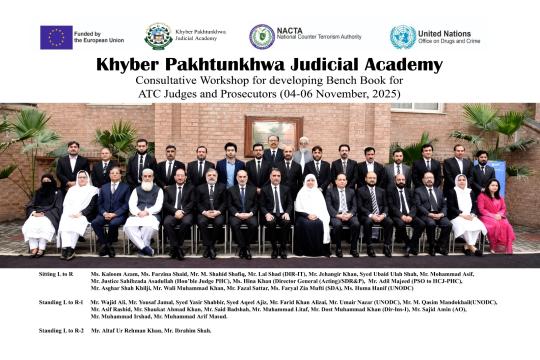The Consultative Workshop for Developing the Bench-Book for Anti-Terrorism Court (ATC) Judges and Prosecutors successfully concluded at the Khyber Pakhtunkhwa Judicial Academy (KPJA), Peshawar. The three-day activity was organized by UNODC Pakistan in collaboration with KPJA under its Counter-Terrorism Programme.
The workshop aimed to review, refine, and validate the draft Bench-Book for ATC Judges and Prosecutors, ensuring that it is legally sound, contextually relevant, and consistent with international human rights standards. The initiative seeks to promote judicial uniformity, strengthen fair trial practices, and enhance the effective adjudication of terrorism-related cases in Pakistan.
The inaugural session was graced by Hon’ble Mr. Justice Sahibzada Asad Ullah, Judge Peshawar High Court, as Chief Guest.
In her welcome remarks, Ms. Hina Khan, Senior Director Research & Publications / Acting Director General KPJA, reaffirmed the Academy’s commitment to judicial capacity building through research-driven collaboration and practical training initiatives.
Mr. Shahid Shafiq, Consultant UNODC and Judicial Expert, presented an overview of the activity, outlining the objectives and structure of the workshop. All Directors of the Academy were also present during the opening ceremony.
The academic sessions of the workshop were led by Mr. Shahid Shafiq, former District & Sessions Judge Sindh, and Mr. Muhammad Qasim Mandokhail, Advocate Supreme Court / Consultant UNODC.
Day 1 focused on reviewing and finalizing Chapters I and II of the draft Bench-Book, covering the legal framework, jurisdiction, and powers of Anti-Terrorism Courts under the Anti-Terrorism Act, 1997. Participants—comprising 17 District & Sessions Judges, Anti-Terrorism Court, and Special Court Judges from across Khyber Pakhtunkhwa—actively contributed their insights to ensure procedural clarity and coherence in interpretation of ATA provisions.
Day 2 was dedicated to best practices in investigation, trial management, and judgment writing. The participants reviewed and finalized Chapters III to VI, focusing on maintaining judicial integrity, ensuring due process, and strengthening coordination between investigation and prosecution.
Day 3 featured consolidation, peer review, and recommendations. Participants examined the Electronic Evidence Module, addressing procedures for collection, preservation, and admissibility of digital evidence. A panel of senior ATC judges discussed oversight mechanisms, evidential value of electronic data, and judicial best practices.
The workshop concluded with the adoption of the “KPJA Declaration on Enhancing ATC Judicial and Prosecution Practices and Electronic Evidence Collection and its Admissibility.”
The Concluding Ceremony was chaired by Mr. Jehanzeb, Director General KP Judicial Academy, as Chief Guest. In his remarks, he commended the participants for their active engagement and lauded the collaborative efforts of UNODC Pakistan and KPJA in advancing judicial excellence and consistency in counter-terrorism adjudication.
Mr. Shahid Shafiq presented the Vote of Thanks on behalf of UNODC, acknowledging the contributions of participants and the sustained partnership between UNODC and KPJA. The event concluded with the conferment of certificates upon all participants.
This collaborative initiative marks another milestone in the joint efforts of KPJA and UNODC toward strengthening judicial capacity, standardizing practices, and promoting the rule of law in Pakistan.
#KPJudicialAcademy #UNODC #JudicialCapacityBuilding #CounterTerrorismJustice #ATCBenchBook #RuleOfLaw #Peshawar
KP Judicial Academy
Copyright©2013-2025, Khyber Pakhtunkhwa Judicial Academy, Old Sessions Court Building, Jail Road, Peshawar (2500), Khyber Pakhtunkhwa, Pakistan
Contact us
- Phone: +92-91-9214252 / 9210744-8
- Fax: +92.91.9210929
- info@kpja.edu.pk
- www.kpja.edu.pk .
- All Staff Contact List
Zircon - This is a contributing Drupal Theme
Design by WeebPal.
Design by WeebPal.

